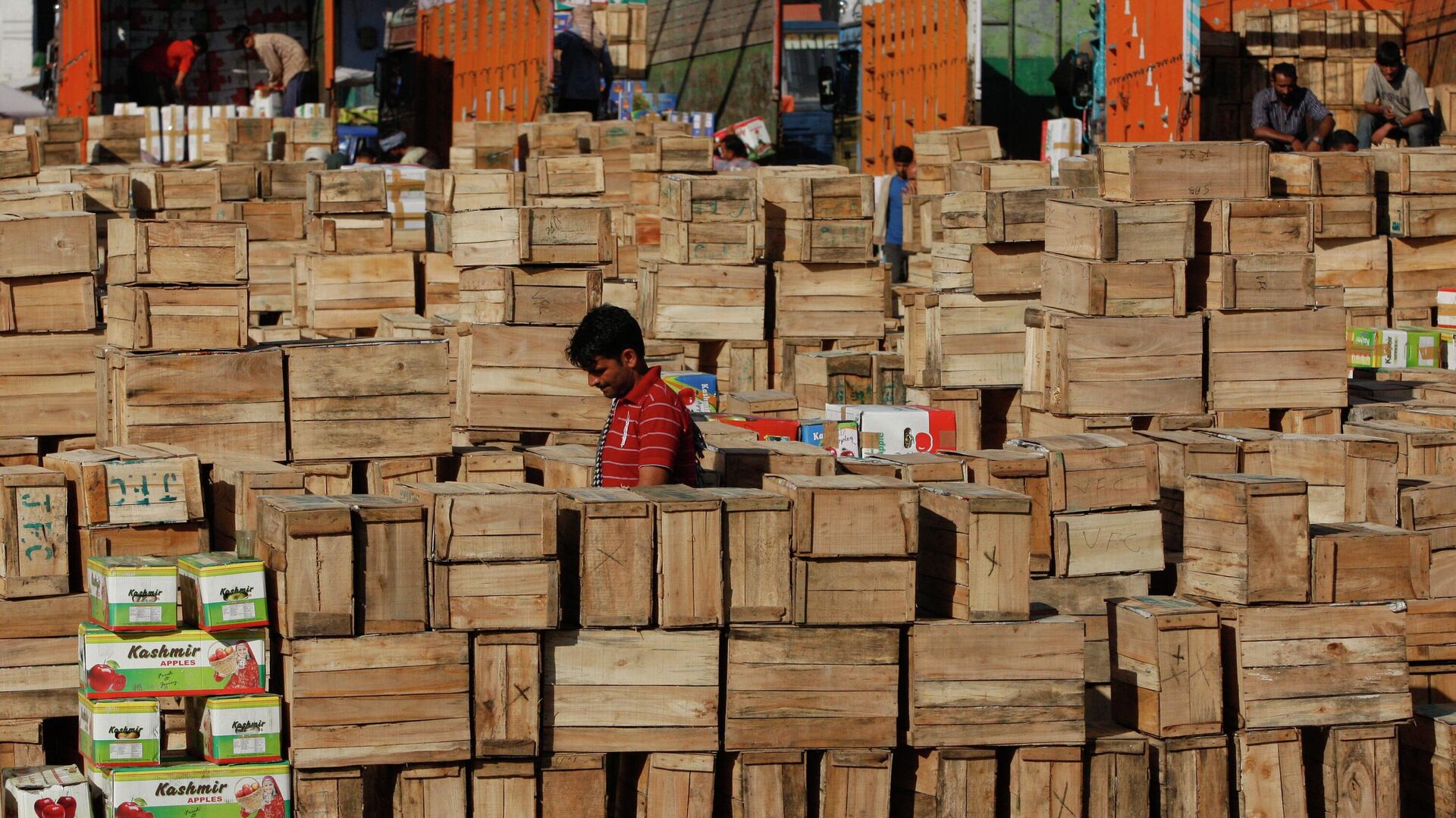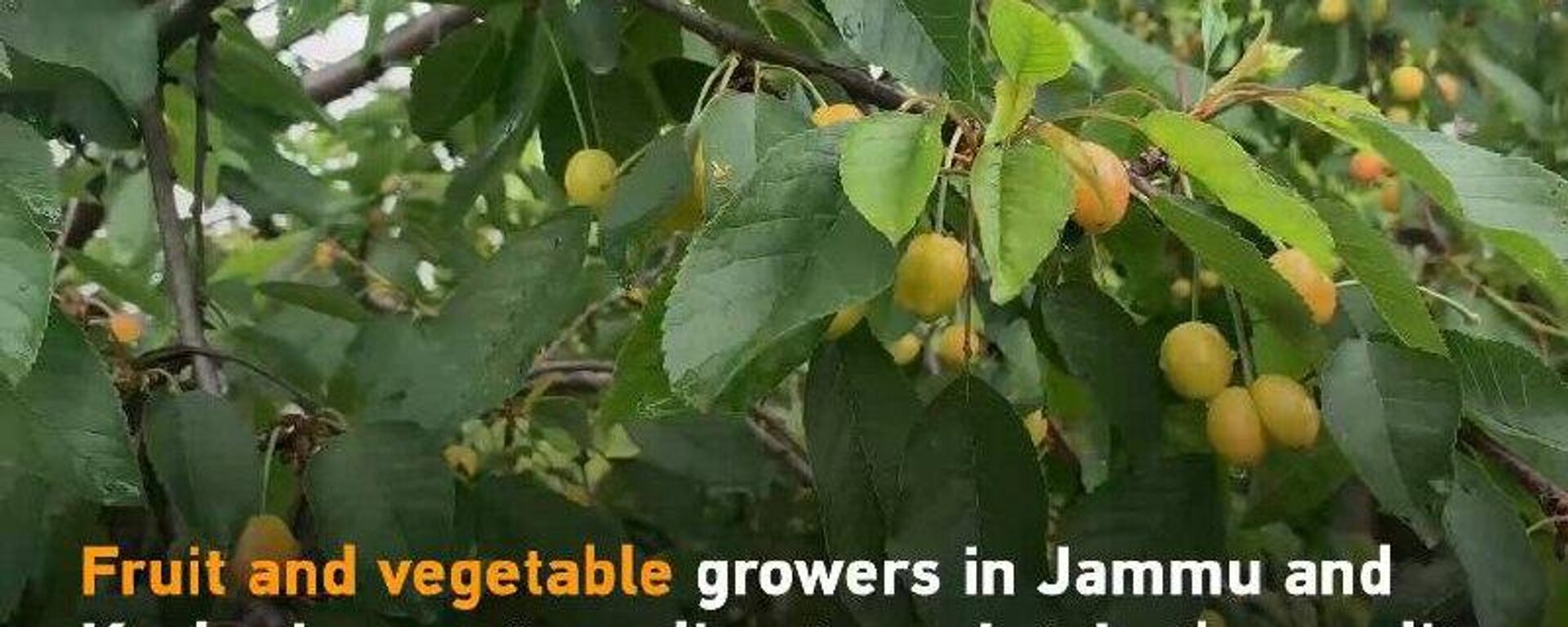https://sputniknews.in/20230809/apple-farmers-in-india-need-3-years-to-recover-losses-caused-by-rains-expert-3438410.html
Apple Farmers in India Need 3 Years to Recover Losses, Caused by Rains: Expert
Apple Farmers in India Need 3 Years to Recover Losses, Caused by Rains: Expert
Sputnik India
The apple crop has been badly hit by adverse weather conditions this year, leading to soaring prices of the fruit in wholesale as well as retail markets.
2023-08-09T10:00+0530
2023-08-09T10:00+0530
2023-08-09T10:00+0530
sputnik opinion
india
himachal pradesh
jammu
jammu and kashmir (j&k)
monsoon rains
indian farmers
agriculture
https://cdn1.img.sputniknews.in/img/07e7/08/08/3476941_0:176:3017:1873_1920x0_80_0_0_e89fecf9d0fcc63de0e9826e999fbc0d.jpg
The apple crop has been badly hit by adverse weather conditions this year, leading to soaring prices of the fruit in wholesale as well as retail markets.During the start of the season, it was hit by inadequate snowfall while later heavy rains wiped away at least 10 percent of apple orchards from Himachal Pradesh.Media reports quoting Apple Growers Association of India and Kashmir Valley Fruit Growers suggest that apple production is likely to witness a decline of 50 percent as compared to 1.87 million metric tons produced last year.In an interview with Sputnik India, Apple Growers Association of India president Ravinder Chauhan talked about the factors that have impacted apple production, the situation of apple farmers, and other issues related to the fruit's farming.Sputnik: Some reports suggest that Apple production has been hit by heavy rains. Can you please elaborate on how will it impact farmers?Chauhan: First, people have to understand that there are three components in agriculture and horticulture – plantation, production & productivity, and marketing & value addition. I would like to make it clear that the production of apple takes place in April. Therefore, it would be wrong to say that heavy rains have impacted the production and productivity of the apple crop.The dormancy of the apple tree ends in March then sap starts taking up to the tree after 15 days followed by sprouting of the spur, green bud, pink bud, and flowering. The flowering takes place during the first week of April. After flowering, the fruits start setting up during mid-April, and then they start developing.Apart from this, another reason why the production is almost half of the last year is that the chilling and frost-biting was there when the trees were flowering due to which the flower aborted. Therefore, the production was hit.However, the quality, size, color of the crop, and metabolic and catabolic system of the tree has been impacted by the torrential rains. Due to heavy rains, the trees were not able to get natural as well as unnatural nutrients. Natural nutrients are already present in the soil while unnatural are those which are given through pesticides, fertilizers, fungicides etc. Along with this, due to rains the incidents of leaf-borne diseases and tree-borne diseases were very high.So, we can say that due to adverse weather conditions the production as well as the productivity of the apple crop took a hit.I am saying this because after suffering a loss this year, if farmers are able to save some money then they will use it for cultivation and production in the next year. And the money they will be using will be less as they are already in loss. So, it will again have an impact. Therefore, it will take around three years for apple farmers to recover the loss.Sputnik: As you said that the production has not been hit by rains rather the crops are mainly affected due to less snow but rains have destroyed farms, roads, power lines and infrastructure. How will this impact the export of apple?Chauhan: See, plucking of the fruit got delayed first and then there was heavy loss to the infrastructure due to torrential rainfall. For example, my village is just 70 kilometers far away from Shimla and the road has been damaged due to landslide after the rains. So, to bring boxes of apple from there to Shimla now farmers require more labour, more time and more money.Therefore, the overall export from the farms or godown to the local market or to anywhere will be heavily impacted. This situation has aggravated the loss to the farmers.Sputnik: Apple cultivation and its value chain is one of the mainstays of rural economy in India. But heavy rains and flash floods wiped out about $122 million worth of fruit. How do you see the impact on the overall economy of the country?Chauhan: As I said previously that the economy of $725 million (INR 60 billion) of apple will come down to $483 million (INR 40 billion). If I talk particularly about Himachal Pradesh, the terrain is by and large situated at 60 degrees slope and fields here are not big fields rather small fields.Sputnik: Due to heavy rainfall and flash floods, around 10% of Himachal's apple orchards have been washed away, which is a major loss as it takes around 15 years for the tree to give fruit. How will farmers prepare for the upcoming season?Chauhan: It is right that at least 10 percent apple orchards of Himachal Pradesh have been washed away due to heavy rainfall this year. However, as far as the gestation period of an apple tree is concerned it is right that earlier a tree used to take at least 12-15 years to give fruit but now it is reduced to 3-5 years as the latest variety, high-end cultivation and small size trees have come up.As far as preparations of farmers for the upcoming season is concerned, farmers will have to prepare the fields first in December then prepare the seeds followed by plantation. After the plantation they will have to maintain it, replenish it, provide it fertilizers and other nutrients etc. However, all this will require capital of which farmers will be falling short as they have already suffered a huge loss this year.We need to understand that apple is a monoculture crop, and not like paddy or wheat which are short-tenure crops. The cultivation of apple is very difficult because the trees are not too big and sunlight penetration as well as water circulation becomes difficult.It is also important to understand that the interest on the loans should not be waived off because the loans availed on Kisan Credit Card (Farmers’ Credit Card) are at a very low interest rate, and waiving off the interest will not help the farmers.Hence, to re-strengthen the apple farmers it is important to defer their loans for at least two years.Sputnik: Can you also elaborate that how will farmers plan their post-production management after suffering such a heavy loss?Chauhan: If we talk about post-production, we need to understand that the harvesting of the apple ends in the first week of September. After that, the floor of the fields has to be managed irrespective of the fact that farmers have suffered a loss or are in profit. Then in December, basin of the tree has to be made and in November one spray of fertilizer has to be given.Therefore, all the operations have to be done despite the fact that farmers have suffered losses. This is the reason why I have urged the government to consider deferring the farm loans.
https://sputniknews.in/20230604/incessant-rains-and-cold-weather-threaten-kashmiri-fruit-growers-2305068.html
india
himachal pradesh
jammu
jammu and kashmir (j&k)
Sputnik India
feedback.hindi@sputniknews.com
+74956456601
MIA „Rossiya Segodnya“
2023
Rahul Trivedi
https://cdn1.img.sputniknews.in/img/07e6/0c/13/136500_0:0:628:627_100x100_80_0_0_72097ff894c7446b70d2efafcb719720.jpg
Rahul Trivedi
https://cdn1.img.sputniknews.in/img/07e6/0c/13/136500_0:0:628:627_100x100_80_0_0_72097ff894c7446b70d2efafcb719720.jpg
News
en_IN
Sputnik India
feedback.hindi@sputniknews.com
+74956456601
MIA „Rossiya Segodnya“
Sputnik India
feedback.hindi@sputniknews.com
+74956456601
MIA „Rossiya Segodnya“
Rahul Trivedi
https://cdn1.img.sputniknews.in/img/07e6/0c/13/136500_0:0:628:627_100x100_80_0_0_72097ff894c7446b70d2efafcb719720.jpg
apple crop, adverse weather condition, wholesale market, retail market, himachal pradesh, apple growers association of india, kashmir valley fruit growers, apple production to witness a decline of 50 per cent, ravinder chauhan, agriculture, horticulture, plantation, production, productivity, marketing, value addition, production and productivity of apple crop, apple is a temperate zone crop, pesticides, fertilizers, fungicides, heavy rains, flash floods, apple orchards, gestation period of apple tree, kisan credit card, deferment of loan, farm loans
apple crop, adverse weather condition, wholesale market, retail market, himachal pradesh, apple growers association of india, kashmir valley fruit growers, apple production to witness a decline of 50 per cent, ravinder chauhan, agriculture, horticulture, plantation, production, productivity, marketing, value addition, production and productivity of apple crop, apple is a temperate zone crop, pesticides, fertilizers, fungicides, heavy rains, flash floods, apple orchards, gestation period of apple tree, kisan credit card, deferment of loan, farm loans
Apple Farmers in India Need 3 Years to Recover Losses, Caused by Rains: Expert
India is one of the world’s top apple producer countries. It's Himachal Pradesh, called an apple state, accounts for almost 20 percent of the global apple production whereas Jammu and Kashmir produces over 75 percent of the country’s apple production.
The
apple crop has been badly hit by adverse weather conditions this year, leading to soaring prices of the fruit in wholesale as well as retail markets.
During the start of the season, it was hit by inadequate snowfall while later heavy rains wiped away at least 10 percent of apple orchards from
Himachal Pradesh.
Media reports quoting Apple Growers Association of India and Kashmir Valley Fruit Growers suggest that apple production is likely to witness a decline of 50 percent as compared to 1.87 million metric tons produced last year.
In an interview with Sputnik India, Apple Growers Association of India president Ravinder Chauhan talked about the factors that have impacted apple production, the situation of apple farmers, and other issues related to the fruit's farming.
Sputnik: Some reports suggest that Apple production has been hit by heavy rains. Can you please elaborate on how will it impact farmers?
Chauhan: First, people have to understand that there are three components in agriculture and horticulture – plantation, production & productivity, and marketing & value addition. I would like to make it clear that the production of apple takes place in April. Therefore, it would be wrong to say that heavy rains have impacted the production and productivity of the apple crop.
The dormancy of the apple tree ends in March then sap starts taking up to the tree after 15 days followed by sprouting of the spur, green bud, pink bud, and flowering. The flowering takes place during the first week of April. After flowering, the fruits start setting up during mid-April, and then they start developing.
So, the production took a hit during that period only. The production has been hit, not due to heavy rainfall but as the duration of the winter season was less and there was almost no snow. It is important to understand that apple is a temperate zone crop that requires optimum chilling of at least 1,500-2,000 hours (around 50-61 days). This was not the case this year.
Apart from this, another reason why the production is almost half of the last year is that the chilling and frost-biting was there when the trees were flowering due to which the flower aborted. Therefore, the production was hit.
However, the quality, size, color of the crop, and metabolic and catabolic system of the tree has been impacted by the
torrential rains. Due to heavy rains, the trees were not able to get natural as well as unnatural nutrients. Natural nutrients are already present in the soil while unnatural are those which are given through pesticides, fertilizers, fungicides etc. Along with this, due to rains the incidents of leaf-borne diseases and tree-borne diseases were very high.
So, we can say that due to adverse weather conditions the production as well as the productivity of the apple crop took a hit.
The farmers will be on the receiving end due to this because the economy of $725 million (INR 60 billion) of apple will come down to $483 million (INR 40 billion). However, adding to the woes of the farmers, the loss will not only be for this year rather will continue next year also.
I am saying this because after
suffering a loss this year, if farmers are able to save some money then they will use it for cultivation and production in the next year. And the money they will be using will be less as they are already in loss. So, it will again have an impact. Therefore, it will take around three years for apple farmers to recover the loss.
Sputnik: As you said that the production has not been hit by rains rather the crops are mainly affected due to less snow but rains have destroyed farms, roads, power lines and infrastructure. How will this impact the export of apple?
Chauhan: See, plucking of the fruit got delayed first and then there was heavy loss to the infrastructure due to torrential rainfall. For example, my village is just 70 kilometers far away from Shimla and the road has been damaged due to landslide after the rains. So, to bring boxes of apple from there to Shimla now farmers require more labour, more time and more money.
Therefore, the
overall export from the farms or godown to the local market or to anywhere will be heavily impacted. This situation has aggravated the loss to the farmers.
Sputnik: Apple cultivation and its value chain is one of the mainstays of rural economy in India. But heavy rains and flash floods wiped out about $122 million worth of fruit. How do you see the impact on the overall economy of the country?
Chauhan: As I said previously that the economy of $725 million (INR 60 billion) of apple will come down to $483 million (INR 40 billion). If I talk particularly about Himachal Pradesh, the terrain is by and large situated at 60 degrees slope and fields here are not big fields rather small fields.
So, heavy rains and flash floods wipe away a lot of fields along with the trees which will now take a few years to recover. Therefore, there will be an adverse impact on the economy of the state. And thus of the country due to torrential rains as there have been losses everywhere be it infrastructure, farms etc. as flash floods and landslides wiped them away.
Sputnik: Due to heavy rainfall and flash floods, around 10% of Himachal's apple orchards have been washed away, which is a major loss as it takes around 15 years for the tree to give fruit. How will farmers prepare for the upcoming season?
Chauhan: It is right that at least 10 percent apple orchards of Himachal Pradesh have been washed away due to heavy rainfall this year. However, as far as the gestation period of an apple tree is concerned it is right that earlier a tree used to take at least 12-15 years to give fruit but now it is reduced to 3-5 years as the latest variety, high-end cultivation and small size trees have come up.
As far as preparations of farmers for the upcoming season is concerned, farmers will have to prepare the fields first in December then prepare the seeds followed by plantation.
After the plantation they will have to maintain it, replenish it, provide it fertilizers and other nutrients etc. However, all this will require capital of which farmers will be falling short as they have already suffered a huge loss this year.
We need to understand that apple is a monoculture crop, and not like paddy or wheat which are short-tenure crops. The cultivation of apple is very difficult because the trees are not too big and sunlight penetration as well as water circulation becomes difficult.
Therefore, I would request the government in the capacity of a farmer or as a farmer leader that the loans given to apple farmers should be deferred to at least two years. I am not asking for a complete waive-off but a deferment.
It is also important to understand that the interest on the loans should not be waived off because the loans availed on Kisan Credit Card (Farmers’ Credit Card) are at a very low interest rate, and waiving off the interest will not help the farmers.
Hence, to re-strengthen the apple farmers it is important to defer their loans for at least two years.
Sputnik: Can you also elaborate that how will farmers plan their post-production management after suffering such a heavy loss?
Chauhan: If we talk about post-production, we need to understand that the harvesting of the apple ends in the first week of September. After that, the floor of the fields has to be managed irrespective of the fact that farmers have suffered a loss or are in profit. Then in December, basin of the tree has to be made and in November one spray of fertilizer has to be given.
Therefore, all the operations have to be done despite the fact that farmers have suffered losses. This is the reason why I have urged the government to consider deferring the farm loans.



